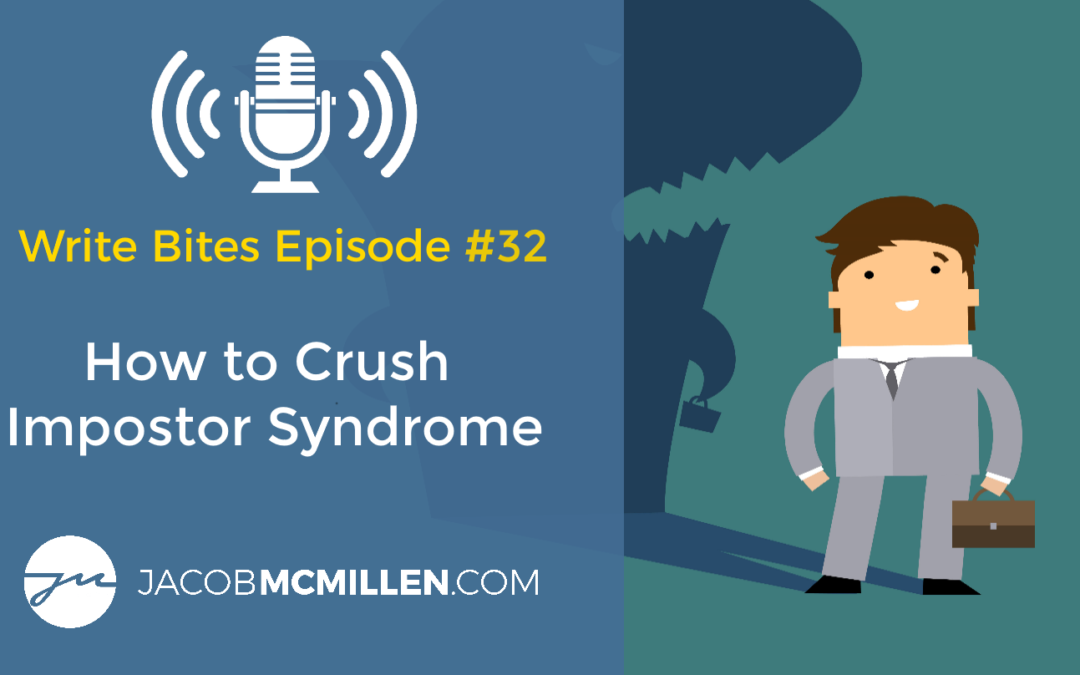Writing and marketing are both fun, because you can be kicking ass for YEARS and then wake up one morning feeling like a complete fraud.
It’s so prevalent, it’s become something of a running joke among writers and marketers alike.
And that’s why today, I’m putting on my buzzkill pants and swooping in to kill the joke.
In this episode, I’m going to teach you three strategies to absolutely crush imposter syndrome… permanently.
Listen To The Recording
[powerpress]
Watch The Video
Read The Transcript
Hey guys, welcome to Write Bites, a series of 10 minute episodes on writing, marketing, and freelancing.
In this episode, we’re going to be talking about Imposter Syndrome and I’m going to be giving you three strategies to beat Imposter Syndrome now and throughout the rest of your career.
This is not an issue that is specific to beginners. I know people who have been in the game for 10 or 15 years and still struggle with this. You’ll find that simply having experience – simply knowing how to do something – isn’t usually enough to fully beat that Imposter Syndrome. You need a clear strategy and that’s what we’re going to cover here.
#1: Do Things That Make You Feel Legit
So a lot of people, their biggest challenge with Imposter Syndrome is that it’s usually vague. You don’t necessarily know why you feel like it. You just think “Hey, this person is legit. I’m not”, or “I’m not really sure if I’m legit”.
How do you beat that?
You get specific.
When you start to have those feelings, think about someone who’s a non-imposter. Someone who you’re like, “Oh, they’re legit. They know what they’re doing. They got their shit together.”
And ask yourself… what can they do – or what about them, what qualities about them, what masteries, what specific achievements do they have that I don’t feel like I could match? What is that gap? What’s the thing that’s keeping me from being a non-imposter? And then go try it.
So, for example, if you’re like “Hey, legit people get published on Forbes”, or on HubSpot, or whatever the big blog is in your niche – or the big publication – wherever the thing is that you think “Hey, that’s where the legit people get published.” Go try to get published there!
Go look through what’s getting published on that site and pitch something that you think could get on.
Strategize: what are the types of posts that these publications want? And then send it to them.
You’ll find that it really doesn’t have anything to do with quality and expertise, or any of these things that you think are like a dividing line.
It has more to do with understanding their own system, their own ecosystem the specific way things work in a given niche or a given platform or a given circle.
If you’re just intentional, a lot of times you can infiltrate these things and you can accomplish something that you previously may have thought was outside of your depth.
#2: Find Ways You Can Have an Impact
In a similar example, if you think, “Hey – real pros, they’re publishing case studies about how they got 100% ROI for a client.”
Have you ever tried to get 100% ROI for a client?
A lot of times if you’re just a blog writer and you’re just writing blogs, you don’t even have a chance to get 100% ROI for a client. Companies that you’re working with probably aren’t even telling you about their stats, you know?
So put yourself in a position where you could actually find out the impact that you’re having.
Put yourself in a position where you work with someone who’s trying to increase their ROI by 100% – you know, so difficult to find someone who wants that.
Go put yourself in a position where you can actually try something. If you’re not in a position where you could fail at something, it’s very unlikely that you’re going to have a chance to genuinely succeed at it either.
Like sometimes you have to force yourself into these roles, into these gigs, into these opportunities that really stretch yourself. And this kinda translates into the second strategy, which is go deeper on your skillset.
There was a point maybe four or five years into my career where I had my lead generation cooking for me. It was bringing in like 30 to 40 leads per month.
And out of those I’d close maybe five, six, seven that were like the top paying ones. Pretty lucrative, six, seven, eight thousand dollar website projects that took me like a week to do.
And then I was also getting some pretty good recurring blog post gigs that would pay me two, three, four thousand a month.
Everything was working really well for me. But it wasn’t stretching me.
I wasn’t really learning anything. I was working with a lot of the same types of businesses. I knew what they needed. I could do a great job for them. So I just did it and, I did it month in, month out.
And it was great! I was making great money, but my skillset wasn’t really ever expanding.
I wasn’t learning new things. Most of these companies didn’t get enough traffic to really be able to split test the performance of the copy.
So it was really just “Hey, I can write this great copy that you like” and you sign off on and are happy to pay me for, but how do I even know if it’s actually performing well?
Short answer – I didn’t.
And so it was one of those things where I could continue along in that vein, but at the end of the day, how do I actually know if I’m good? I don’t, because I’m not putting myself in a position where I can actually fail at what I’m trying to do.
And that’s why a lot of people end up in these situations where they’re 15 years deep in a career and they have this Imposter Syndrome because they don’t actually know: “If I had to actually profit through the conversion rate of my own copy, could I pull it off?”
They don’t know because they’ve never been in a position where they could actually fail. They never worked with a client where they’re actively testing it and saying, Hey, this did not perform”. And so you have to be willing to go out and put yourself in that position.
And it’s a little scary. It absolutely is. But you know, it’s the only way to grow.
If you’re not uncomfortable, you’re probably not growing.
That’s the second thing. The third thing is: understand that mastery really comes from the ability to replicate something consistently.
#3: Build Mastery Through Repetition
A one-time result is not enough to feel secure in your mastery on something.
One of the first content marketing clients I worked with, I doubled their traffic in about six months. And it felt great, you know? I felt like, “Oh, I feel like I really have a handle on how to bring in real monthly SEO traffic for this client”.”
Or, you know, I worked with a client for the first time who I got a markedly increased conversion rate on a landing page. Feels great, but again: one time isn’t enough to really know for sure. Two times isn’t really enough to know for sure that you can do it.
I don’t know if there’s a magic number on, “Hey, once you do it X number of times, that – all of a sudden – Imposter Syndrome goes away forever”.
But I do know that Imposter Syndrome is usually linked to this question of, “Hey, maybe I’ve done it once, but could I do it again?” or “I’ve done it twice, but could I actually do this the next time?” Or is there a high likelihood that I’m going to fail in the next try?
The reason it’s called Imposter Syndrome rather than just being an imposter is because the people who are dealing with this have actually succeeded a lot of times.
You’ve had success in the past. You’ve had stuff that worked. But maybe you’re not sure if you could do it again. You’re not sure if you really deserve to be in the conversation that you’re currently in.
And a lot of that sometimes can stem just from the fact that you actually don’t know yet if it’s replicable. If you have one big client that you’ve worked with for a long time, you don’t actually know “Could I replicate the success I’ve had with this client with another client?”
And the only way to know for sure is to go try it with another client. It’s not the type of thing that just magically disappears.
You have to actually go do the work to indicate to yourself that “Hey, I can do this consistently”.
And “consistently” does not mean 100%.
You’re going to find, especially if you’re in more of the marketing side of things, there’s so many variables that affect marketing that you have absolutely no say in, even on the copywriting side.
Product fit – product-market fit – has more to do with the success of any given landing page than the copywriting does. Like There’s all these variables that come into it that can affect performance. So it’s not like you’re looking for a 100% success rate.
It’s more just looking for that knowledge that “Hey, I can go in, and if I work consistently with a bunch of clients over time, I’m going to succeed with most of them”.
So those are the three things.
Conclusion
To recap real quick:
- Identify what a non imposter would do and try it for the first time. Be willing to go out – if you’re someone who’s never even worked with a client where they’re split testing or where they’re tracking any sort of metric – go prioritize finding some of those clients.
- Go deeper on your skillset and look to really understand the deeper side of what you’re doing. Look to go deeper than just what makes the client happy and really understand what moves the key metrics.
- Understand that it’s about replication. And that mastery is about the ability to know that “Hey, if I get thrown into any given project in any given niche, I have a system and I have a set of skills that I can use to consistently get results more often than not”. To get results in most situations provided the variables aren’t just stacked to a point where nobody could do it.
And that’s how you grow from always being pestered with Imposter Syndrome…
To feeling really confident in your skills and feeling like you really have a mastered skill set to offer in the marketplace.
So, I hope that was helpful. And I will catch you guys in the next episode!
Want More Write Bites?
Click here to subscribe to the podcast.
Share Your Thoughts
I hope this was helpful, and I’d love to hear your thoughts on this topic.
Do you agree? Do you disagree with the fierce heat of a thousand suns?
Let me know in the comments below.
Plus, if you have a question you want answered on a future Write Bites episode, ask in the comments or shoot me an email, and I’ll add it to the schedule.






Since most people I know feel like a fraud at least some of the time, this advice is helpful. I like how specific and actionable your suggestions are.
Thanks Janet, glad you found it helpful!